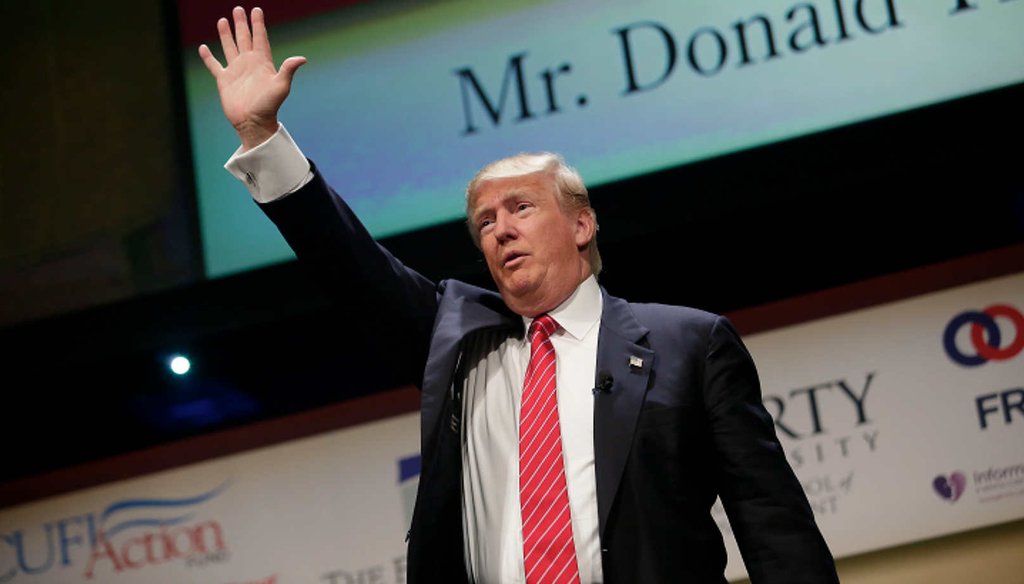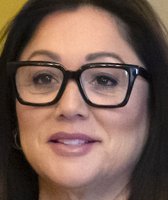Stand up for the facts!
Our only agenda is to publish the truth so you can be an informed participant in democracy.
We need your help.
I would like to contribute

Donald Trump in Ames, Iowa. His comments about Sen. John McCain, R-Ariz., raised questions about Trump's Vietnam draft record. (NYT)
With his signature flair for controversy, billionaire Republican presidential candidate Donald Trump challenged the Vietnam War service credentials of Sen. John McCain, R-Ariz.
"He’s a war hero because he was captured," Trump said July 18, 2015, during an interview in Ames, Iowa. "I like people who weren’t captured."
McCain ended up in a Hanoi POW camp after his Navy dive bomber was shot down in 1967. He broke both arms and a leg as he ejected. He endured enormous pain and torture and spent over five years in captivity.
While McCain was surviving as a prisoner, Trump was a college student at the University of Pennsylvania Wharton School. His remarks about McCain drew attention to how he spent his time during Vietnam, but that part of his resume was in the line of fire even before he disparaged his Republican colleague.
Ronald Kuby, a criminal and civil rights lawyer and talk show host, appeared on WABC-AM in New York City on July 15, 2015, three days before Trump made his controversial comments. Kuby highlighted the multiple student deferments Trump received, and how he finally got a medical exemption that staved off the draft.
Sign up for PolitiFact texts
Trump "was a Vietnam draft dodger," Kuby said.
We asked Kuby what he meant and he explained, "I use the term broadly to mean anyone who took advantage of deferments to avoid being drafted."
In theory, that could apply to a huge number of people. In the course of the Vietnam War, about 15.4 million men received deferments, were exempted or disqualified. In contrast to those millions, the government charged 210,000 people with draft violations, ranging from burning their draft cards to refusing to serve to fleeing the country.
"The only people who violated the Selective Service Act did so out of principle," Kuby said. "They were going to show they were not cowards by risking imprisonment to protest an immoral war. If you were white and middle class, there were many legal ways out."
Kuby said that draft dodger is not a legal term.
Michael Tigar, professor of law emeritus at Duke Law School, agrees. In 1969, Tigar co-wrote an analysis of the Selective Service system for the George Washington University Law Review.
"The term ‘draft dodging’ is a characterization that does not reflect any legal category, but rather somebody's view of the assiduousness and honesty with which a draft registrant seeks to avoid service," Tigar told us. "Many people who might have sought exemption or deferment from the draft decided to volunteer. Many others sought ways around participation in the military conflict."
During the war, the draft dodging term was used loosely. An Associated Press headline from 1967 said "LBJ hopes to stop draft dodging." The article was about dropping student deferments for men in graduate school.
The loose meaning of draft dodging continued into the 21st century. A 2008 article on the Israeli government’s effort to shut down websites that suggest ways for young people to legally avoid conscription had the headline "Websites on draft dodging to be probed."
That said, there are times when draft dodging means that someone broke the law. A clear example is fleeing to Canada. Hundreds of men did so, which prompted President Jimmy Carter to issue a blanket pardon for them and others who took extreme steps to avoid participating in the Vietnam War.
But Kuby used the term more casually. Effectively, he was saying he thinks Trump was trying to avoid the draft. The only way to prove Kuby wrong would be to know Trump’s motivations at the time. That is not checkable and Kuby’s claim is more a moral judgment than a statement of fact.
Given that we can’t determine Trump’s intent. All we can do is look at the record.
Thanks to a 2011 Freedom of Information Act request by the website TheSmokingGun.com, Trump’s Selective Service record is available to anyone.
The 2-S classifications are Trump’s student deferments. The first two covered his time at Fordham University in the Bronx, and the second two allowed him to stay in school when he transferred to study business at the University of Pennsylvania.
At the time, as Tigar wrote in his 1969 article, any college student who asked could get a student deferment. When he graduated in 1968, Trump’s classification shifted to 1-A, or "available for service."
Had that stood, Trump would have been drafted.
But Trump had a physical exam in September 1968. He had taken one less than two years earlier that did not disqualify him for service as we can tell from his 1-A classification in July 1968. However, his second physical was followed in October with a new classification, 1-Y. That designation put him near the bottom of any call-up list. It meant he would only be drafted if there were a national emergency.
Until recently, the only detail on record about that shift was it was medically related. After his comments about McCain, Trump said it had to do with bone spurs in his heels. Trump reportedly was active in college sports, playing baseball, tennis and squash.
More on the medical deferment
Trump failed to mention his medical deferment when he told ABC News on July 19, 2015, that he was never drafted because the draft lottery went into effect and his birthday came with a high number.
"If I would have gotten a low number, I would have been drafted. I would have proudly served," he said. "But I got a number, I think it was 356. That’s right at the very end. And they didn't get -- I don’t believe -- past even 300, so I was -- I was not chosen because of the fact that I had a very high lottery number."
Late in 1969, the nation changed the selective service law to pick people through a random selection of birth dates. The very first drawing was on Dec. 1, 1969.
As TheSmokingGun.com website pointed out, the draft lottery came two months after Trump received his 1-Y classification. Essentially, even if Trump’s birthday, June 14, had been pulled first, he would not have been called to serve.
Trump’s memory served him well on one point. His number was indeed 356.
No law broken
Kuby backed up his use of the draft dodger term with a musical reference. Phil Ochs was a Vietnam era protest singer who wrote The Draft Dodger Rag in 1965. The lyrics imagine a young man at the Selective Service office.
"Sarge, I'm only eighteen, I got a ruptured spleen
And I always carry a purse.
I got eyes like a bat, and my feet are flat, and my asthma's getting worse.
Yes, think of my career, my sweetheart dear, and my poor old invalid aunt
Besides, I ain't no fool, I'm a-goin' to school,
And I'm working in a DEE-fense plant
And to show the supplicant’s true intent, the song ends this way:
So I wish you well, Sarge, give 'em Hell!
Kill me a thousand or so.
And if you ever get a war without blood and gore,
I'll be the first to go.
To the best of our knowledge, no one has charged Trump with violating the Selective Service law. His student deferments were routine. And unless someone has new information, there is no legal issue with his medical deferment.
Trump had the opportunity to volunteer and the record speaks for itself that he did not.
Update, July 23, 2015: A previous version of this story said that McCain had not signed a confession under torture. He had.
Our Sources
WABC Radio,Kuby interview, July 15, 2015
Smoking Gun, Deferments Helped Trump Dodge Vietnam, April 28, 2011 (Updated July 18, 2015)
National Archives and Records Administration, Selective Service record: Donald Trump
Politico, Donald Trump evades specifics on his draft deferment, July 19, 2015
ABC News, Donald Trump Says He Does Not Owe John McCain Apology, July 19, 2015
Huffington Post, Here's How Donald Trump Defended Questioning John McCain's Military Record, July 19, 2015
George Washington University Law Review, Selective Service: Some Certain Problems and Some Tentative Answers, March 1969
Pacific Northwest Labor and Civil Rights Projects - University of Washington, Vietnam War: Draft Resistance
Ynetnews.com, Websites on draft-dodging to be probed, Sept. 15, 2015
Aaron Friedberg, In the Shadow of the Garrison State: America’s Anti-statism and its Cold War Grand Strategy, Princeton University Press, 2000
ABA Journal, Jan. 21, 1977: Carter pardons Vietnam-era draft dodgers, Jan. 1, 2014
Phil Ochs, The Draft Dodger Rag, 1965
Gettysburg Times, LBJ hopes to stop draft dodging, April 21, 1967
Email interview, Michael Tigar, professor of the practice of law emeritus, Duke Law School, July 20, 2015
Email interview, Ronald Kuby, attorney and radio host, WABC, July 20, 2015




















































